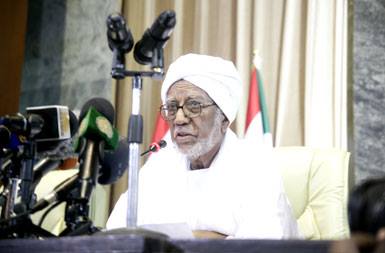Sudan reiterates rejection of U.S. conditions for sanctions lift, hits to stop anti terror cooperation
February 17, 2016 (KHARTOUM) – The foreign ministry Tuesday reiterated its rejection for American conditions to normalize bilateral relations, while the speaker of the Sudanese parliament hinted that his country may stop counter-terrorism cooperation with Washington.

“The government did not accept any precondition and will stick to its rejection of any conditions that do not take into account Sudan’s interests,” said the state minister at the foreign ministry Kamal Eddin Ismail in reaction to the statements of the American diplomat.
He further pointed that the mission of an ambassador is to improve ties with the host country not to challenge its authorities.
Washington designated Sudan as a state sponsor of terrorism in 1993, and imposed comprehensive economic, trade, and financial sanctions against the Sudan In October 1997.
However, in May 2007, the U.S. imposed additional economic sanctions on Sudan. At the time President Bush said the sanctions aim to end the suffering of the millions of Sudanese affected by the crisis in Darfur. Also after the eruption of the conflict in the Two Area in June 2011, Washington said Sudan has to end the conflict and allow humanitarian access to civilians in the affected areas.
Analysts agree that the sanctions changed of nature, pointing that Washington implicitly admitted that when U.S. officials mentioned Sudan’s cooperation in the war against terrorism different times.
But Khartoum refuses to speak about Darfur or the Two Areas and point their efforts to end armed conflicts. Also , they insist that based on the principle of non interference, sovereign states shall not intervene in each other’s internal affairs.
STOP ANTI-TERRORISM COOPERATION
The speaker of the National Assembly Ibrahim Ahmed Omer on Tuesday hinted that Sudan may suspend anti terror cooperation with Washington.
Omer was speaking in a press conference held in Khartoum after his return from a visit to the United States where he participated in a conference on international action on drug problem organized by the Inter-Parliamentary Union (IPU) and the United Nations in New York.
The Sudanese speaker spoke about meetings he held with American Congressmen during his two-week visit to the United States. He added that Sudan is willing to cooperate with any country on issues of terrorism, stressing it is a question of principle.
“If we felt that (some) countries are unwilling, hostile or droning and do not cooperate with Sudan, then the competent authorities will take the appropriate decision,” he said when asked if Sudan would stop cooperation on terrorism with Washington on the light of its rejection to lift sanctions.
Omer however told reporter that his visit was a positive step in the right direction to amend bilateral relations. He said he discussed sanctions, the armed conflicts and terrorism with some Congressmen.
He further said he noted some change in the position of the Congressmen who previously refused to meet Sudanese officials.
(ST)
